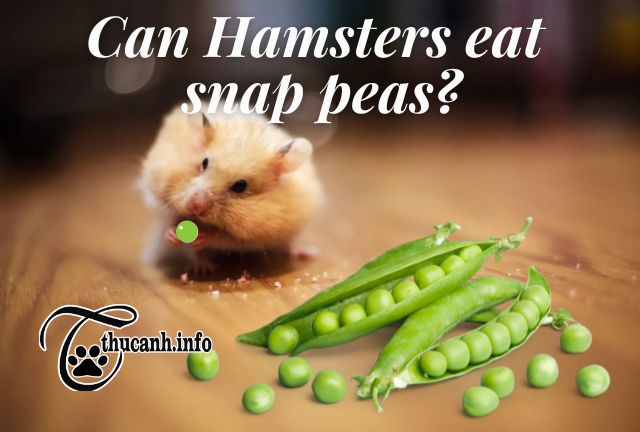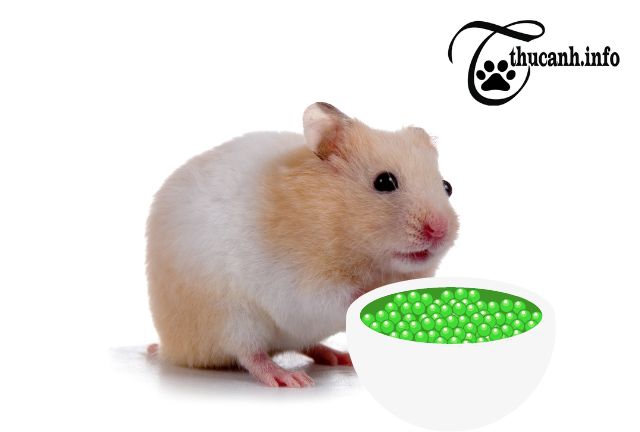Can Hamsters Eat Snap Peas? Hamsters love snacking on fruits and vegetables, but as a responsible pet owner, you should be careful about what you feed them. In this article, we’ll explore the above question, their nutritional benefits, and how much and how often they should be given. We’ll also provide tips on how to introduce new foods into your hamster’s diet.

Is it good or bad for hamsters to eat snap peas?
1. Can Hamsters Eat Snap Peas?
Yes, hamsters can eat snap peas in moderation. Snap peas are a safe and nutritious treat for hamsters, providing essential vitamins and minerals. However, it’s essential to introduce new foods gradually to avoid digestive issues. Remove any uneaten portions promptly to keep their cage clean. Always consult a veterinarian if you have any concerns about your hamster’s diet.
2. Nutritional Benefits of Snap Peas for Hamsters
Snap peas are a great source of vitamins, fiber, and minerals, supporting your hamster’s overall health and immune system. Here is the nutritional benefits table for 100 grams of snap peas for hamsters:
| Nutrient |
Amount Per 100g |
Benefit |
|
Calories |
42 kcal |
Provides energy |
|
Carbohydrates |
7.56 g |
Source of energy |
|
Sugars |
2.62 g |
Natural sweetness |
|
Fiber |
2.5 g |
Supports digestive health |
|
Protein |
2.8 g |
Supports muscle development |
|
Fat |
0.22 g |
Low in fat |
|
Vitamin C |
60 mg |
Boosts immune system |
|
Vitamin A |
1350 IU |
Supports eye health |
|
Vitamin K |
24.8 µg |
Aids in blood clotting |
|
Calcium |
43 mg |
Supports bone health |
|
Iron |
1.47 mg |
Important for oxygen transport |
|
Potassium |
194 mg |
Helps maintain fluid balance |
3. Possible Risks and Side Effects of Feeding Snap Peas to Hamsters
While snap peas can be a healthy addition to a hamster’s diet, there are some potential risks and side effects to be aware of:
- Overfeeding: Offering snap peas in excess can lead to weight gain and obesity in hamsters. Moderation is key to maintaining a healthy diet.
- Gas and Bloating: Snap peas contain fiber, which can cause gas and bloating in some hamsters if consumed in large quantities.
- Allergies: Some hamsters may be allergic to snap peas, leading to skin irritation, itching, or other allergic reactions.
- Pesticides: Ensure that snap peas are thoroughly washed before offering them to your hamster to remove any pesticides or harmful residues.
- Choking Hazard: Be cautious of the size of snap peas given to your hamster, as large pieces can pose a choking hazard.
- Digestive Upset: Introducing snap peas too quickly or in excessive amounts may lead to digestive issues in some hamsters.
To minimize these risks, offer snap peas as an occasional treat rather than a staple in their diet. Always introduce new foods slowly and observe your hamster’s reaction. If you notice any adverse effects, consult with a veterinarian for guidance.

The amount of peas a hamster can eat
4. How much Snap Peas should you feed your hamster?
When feeding snap peas to your hamster, moderation is essential. As an occasional treat, you can offer a small portion, such as one or two small snap peas, once or twice a week. Remember that snap peas should not make up the majority of your hamster’s diet, as they need a balanced diet that includes a variety of foods.
Additionally, observe your hamster’s reaction to the snap peas. If they enjoy the treat and show no signs of digestive upset or allergies, you can continue offering it in small amounts. However, if you notice any adverse effects or changes in behavior, reduce or discontinue the snap peas from their diet and consult with a veterinarian for further advice.
5. Provide guidelines on how to offer Snap Peas to Hamsters
When offering snap peas to your hamster, follow these guidelines:
- Freshness: Ensure the snap peas are fresh and free from any signs of spoilage or mold.
- Preparation: Wash the snap peas thoroughly to remove any dirt or pesticides.
- Portion size: Offer a small portion of snap peas as a treat, usually one or two small snap peas at a time.
- Cutting: You can cut the snap peas into smaller pieces to make them easier for your hamster to handle and eat.
- Supervision: Always supervise your hamster while they are eating snap peas to ensure they don’t overindulge or have any adverse reactions.
- Variety: Offer snap peas as part of a varied diet, including other vegetables, fruits, and hamster pellets.
- Frequency: Give snap peas as an occasional treat, not a daily staple. Once or twice a week is sufficient.
- Allergies: Monitor your hamster for any signs of allergies or digestive issues after eating snap peas. If you notice any adverse reactions, discontinue the treat and consult with a veterinarian.
By following these guidelines, you can safely offer snap peas as a tasty and nutritious treat for your hamster. Remember, treats should only complement their balanced diet, not replace it.
6. Symptoms of Parsnip Allergies in Hamsters
Symptoms of parsnip allergies in hamsters may include:
- Itching and scratching: Hamsters with allergies may frequently scratch themselves, particularly around the face and ears.
- Red or inflamed skin: Allergic reactions may cause the hamster’s skin to become red and inflamed.
- Sneezing or wheezing: Respiratory symptoms like sneezing, wheezing, or difficulty breathing can be a sign of an allergy.
- Watery eyes or nose: Excessive tearing or a runny nose may indicate an allergic response.
- Swelling or hives: Allergic reactions may cause swelling of the face, paws, or body, or the appearance of hives.
- Digestive issues: Hamsters with parsnip allergies may experience diarrhea or other digestive problems.
If you suspect that your hamster is having an allergic reaction to parsnips or any other food, it’s essential to discontinue feeding that food immediately. Consult with a veterinarian to determine the cause of the allergy and to receive appropriate treatment for your hamster.
7. Alternatives to Snap Peas for Hamster Diets
If you’re looking for alternatives to snap peas for your hamster’s diet, consider these safe and nutritious options:
- Carrots: Carrots are rich in vitamins and minerals, providing a crunchy and tasty treat for hamsters.
- Cucumbers: Cucumbers are hydrating and low in calories, making them a refreshing option for hamsters.
- Bell Peppers: Bell peppers are high in vitamin C and come in various colors, offering a colorful addition to your hamster’s diet.
- Zucchini: Zucchini is a low-calorie vegetable that hamsters can enjoy raw or cooked.
- Broccoli Florets: Small pieces of broccoli florets can provide hamsters with essential nutrients and enrichment.
- Green Beans: Fresh or frozen green beans make a nutritious snack for hamsters.

Questions about hamsters and snap peas
8. Frequently Asked Questions (FAQs)
8.1. Can all breeds of hamsters eat Snap Peas?
Yes, all breeds of hamsters can safely eat snap peas as part of their diet. Snap peas are generally safe and nutritious for hamsters, and they can be a great addition to their varied diet. However, as with any new food, it’s essential to introduce snap peas gradually and in small amounts to prevent digestive issues. Observe your hamster’s reaction to the snap peas and ensure they are consuming them without any adverse effects. If you notice any signs of discomfort or intolerance, it’s best to discontinue feeding snap peas and consult a veterinarian for guidance.
8.2. Can your hamsters eat snap pea pods?
Yes, hamsters can eat snap pea pods. Snap pea pods are safe and nutritious for hamsters and can be offered as part of their balanced diet. The pods are an excellent source of fiber and vitamins, which can benefit your hamster’s overall health. However, it’s essential to ensure that the pods are fresh, clean, and free from any pesticides or chemicals before offering them to your hamster. Remember to introduce new foods gradually and in moderation to prevent any digestive issues. Always monitor your hamster’s reaction to new foods and consult a veterinarian if you have any concerns about their diet.
8.3. Can hamsters eat Snap Peas every day?
Hamsters can eat snap peas as part of their regular diet, but it is not recommended to feed them every day. While snap peas are safe and nutritious for hamsters, they should be given in moderation as a treat or occasional snack. Hamsters have specific dietary needs, and a balanced diet should consist of a variety of foods to ensure they get all the necessary nutrients.
Feeding snap peas every day could lead to an unbalanced diet and potentially cause digestive issues if given in excess. It’s best to offer snap peas and other treats in small quantities, a few times a week, to complement their regular hamster food and ensure they receive a well-rounded diet. Always monitor your hamster’s health and adjust their diet if needed, and consult a veterinarian for personalized dietary advice.
8.4. Can baby hamsters eat Snap Peas?
Baby hamsters can eat snap peas, but it’s essential to introduce new foods gradually and in small amounts. When introducing snap peas to baby hamsters, make sure they are fresh and cut into small, manageable pieces that are easy for them to eat. Baby hamsters have delicate digestive systems, so it’s crucial to monitor their reaction to the new food.
Start by offering a tiny piece of snap pea and observe how the baby hamsters respond. If they eat it without any issues and show no signs of discomfort, you can gradually increase the amount over time. However, if you notice any adverse reactions or digestive problems, remove the snap peas from their diet immediately.
Remember that baby hamsters rely primarily on their mother’s milk for the first few weeks of life, and their diet should consist mainly of their regular baby hamster food. Always consult with a veterinarian if you have any concerns about your baby hamster’s diet or health.
8.5. Can dwarf hamsters eat Snap Peas?
Yes, dwarf hamsters can eat snap peas in moderation. Snap peas can be a nutritious and tasty addition to their diet. However, it’s essential to offer snap peas as a treat and not as a primary food source. Dwarf hamsters have small stomachs, and their diet should mainly consist of a balanced commercial hamster food that provides all the essential nutrients.
In conclusion, snap peas can be a safe and nutritious addition to your hamster’s diet when given in moderation and prepared properly. Remember to always introduce new foods slowly and monitor your hamster’s reaction, and consult with your veterinarian if you have any concerns about your pet’s diet or health. We hope the article “Can Hamsters Eat Snap Peas” on Thucanh.info provides you with valuable information.


